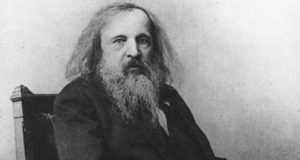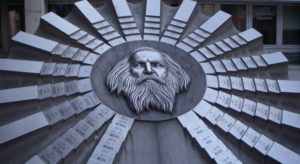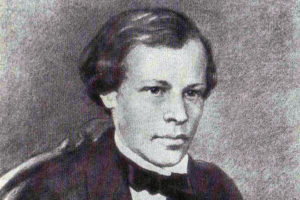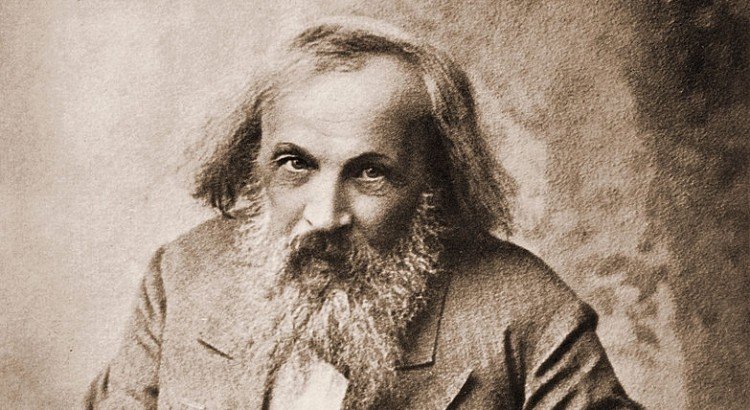Dmitri Ivanovich Mendeleev was a Russian chemist and inventor. He formulated the Periodic Law, created a farsighted version of the periodic table of elements, and used it to correct the properties of some already discovered elements and also to predict the properties of eight elements yet to be discovered. Take a look below for 30 more awesome and interesting facts about Dmitri Mendeleev.
1. Mendeleev was born in the village of Verkhnie Aremzyani, near Tobolsk in Siberia, to Ivan Pavlovich Mendeleev and Maria Dmitrievna Mendeleeva.
2. His paternal grandfather, Pavel Maximovich Sokolov, was a Russian Orthodox priest from the Tver region.
3. His father worked as a school principal and a teacher of fine arts, politics and philosophy at the Tambov and Saratov gymnasiums.
4. His mother came from a well-known dynasty of Tobolsk merchants, founders of the first Siberian printing house who traced their ancestry to Yakov Korniliev, a 17th century posad man turned a wealthy merchant.
5. Mendeleev was raised as an Orthodox Christian, his mother encouraging him to, “patiently search divine and scientific truth.”

6. Mendeleev was the youngest of 17 siblings, of whom only 14 stayed alive to be baptized according to Mendeleev’s brother Pavel, meaning that the others died soon after birth.
7. The exact number of Mendeleev’s siblings differs among sources and is still a matter of some historical dispute.
8. Unfortunately for the family’s financial well being, his father became blind and lost his teaching position.
9. His mother was forced to work and she restarted her family’s abandoned glass factory.
10. At the age of 13, after the passing of his father and the destruction of his mother’s factory by fire, Mendeleev attended the Gymnasium in Tobolsk.
11. In 1849, his mother took Mendeleev across Russia from Siberia to Moscow with the aim of getting Mendeleev a higher education. However, the university in Moscow didn’t accept him.

12. His mother and him continued to Saint Petersburg to the father’s alma mater.
13. The now poor Mendeleev family relocated to Saint Petersburg, where he entered the Main Pedagogical Institute in 1850.
14. After graduation, he contracted tuberculosis, causing him to move to the Crimean Peninsula on the northern coast of the Black Sea in 1855.
15. While at the Crimean Peninsula, he became a science master of the Simferopol gymnasium number 1.
16. He received his Doctor of Science for his dissertation on the “Combinations of Water with Alcohol” in 1865.
17. Mendeleev studied the composition of petroleum and he helped found the first oil refinery in Russia.
18. In 1868, he wrote the two volume textbook Principles of Chemistry, which classified the known elements according to their chemical properties.
19. On March 6th, 1869, Mendeleev made a formal presentation to the Russian Chemical Society entitled The Dependence between the Properties of the Atomic Weights of the Elements.
20. His understanding of the properties of elements based on their atomic weight and valence allowed him to accurately predict that new elements would be found.

21. Some scientists dismissed his idea, but Mendeleev was vindicated by the discovery of gallium in 1875 and germanium in 1875, which perfectly fit into the two missing spaces.
22. Mendeleev is credited with introducing the metric system to Russia.
23. Many things bear his name, including Mendelevium, a synthetic chemical elements with the symbol Md and the atomic number 101.
24. Mendeleev is the name of a large lunar impact crater on the far side of the Moon.
25. While he was known as a genius chemist, he was also able to master the field of geology, meteorology and hydrodynamics.

26. Mendeleev devoted much study and made important contributions to the determination of the nature of such indefinite compounds as solutions.
27. He invented pyrocollodion, a king of smokeless powder based on nitrocellulose. This work had been commissioned by the Russian Navy, which didn’t adopt its use. In 1892, Mendeleev organized its manufacture.
28. In Saint Petersburg, his name was given to the National Metrology Institute dealing with establishing and supporting national and worldwide standards for precise measurements.
29. In Moscow, there is the D. Mendeleyev University of Chemical Technology of Russia.
30. The Russian Academy of Sciences has occasionally awarded a Mendeleev Golden Medal since 1965.




